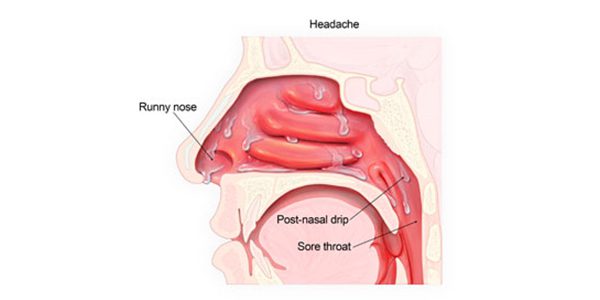Contents
Runny nose: is it a cold or an allergy?
A runny nose is a common symptom, most often mild and temporary. It is usually indicative of a simple cold or allergy. However, it can be a sign of a more serious illness if it persists over time. In this case, it is recommended to consult a doctor.
Description
Rhinorrhea, more commonly known as a runny nose or “runny nose” is an excess of mucus produced and which drains through the front of the nose or towards the throat. It can have a clear and transparent appearance or on the contrary purulent and thick. This aspect is frequent and does not always correspond to a bacterial infection.
Remember that mucus is naturally produced by the lining of the nose and sinuses. It captures the impurities in the air and thus serves as a permanent protection system for the respiratory tract against infections and attacks (smoke, dust, etc.).
The causes
The causes of a runny nose are varied. Among the most common are:
- a cold ;
- influenza ;
- a sinus infection or sinusitis;
- allergies (allergic rhinitis);
- non-allergic rhinitis (due for example to changes in atmospheric pressure, external aggressions or during pregnancy).
The consumption of tobacco, by weakening the mucous membranes of the mouth and nose can also lead to chronic nasal discharge.
Evolution et complications possible
If excess mucus runs down the back of your throat instead of coming out the front of your nose, it can cause a cough or sore throat. If the mucus drains through the eustachian tube (the canal that connects the nose to the middle ear) instead, it can lead to ear pain or an ear infection (otitis).
If the nose is completely blocked, the air trapped in the sinuses cannot be evacuated and then causes pressure which can lead to headaches. In the long term, it can also cause a sinus infection (sinusitis).
Treatment and prevention: what solutions?
If the nose is runny, it is possible to facilitate the flow of mucus through the nose and thus prevent it from accumulating in the sinuses and the nose becoming blocked. For this, there are tips:
- drink plenty of fluids in order to keep the mucus free;
- apply a warm, damp cloth to the nose and face several times a day;
- do inhalations of steam 2 to 4 times a day. Using a bowl of hot water and a towel that you put on your head for example. There are decongestant medications available without a prescription that can be diluted in hot water. It is also possible to buy inhalers.
On the contrary, if the nasal discharge is too much, there are drugs that can reduce the discharge. These medications dry out the nasal passages by reducing mucus production, so it’s important to use them sparingly.
You can do a nasal wash to help remove mucus from your nose. For this, there are salt water sprays that can be bought without a prescription in pharmacies. Most often it is then recommended to make nasal sprays of saline solutions 3 to 4 times a day.
Antihistamines are drugs that treat allergy symptoms and can therefore reduce mucus discharge. They should be used with caution because some antihistamines cause drowsiness.
If the runny nose persists or is accompanied by other symptoms, such as fever, sore throat or a persistent cough, it is recommended to see a doctor.










